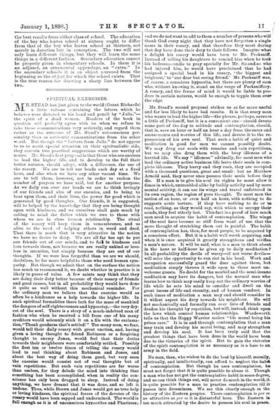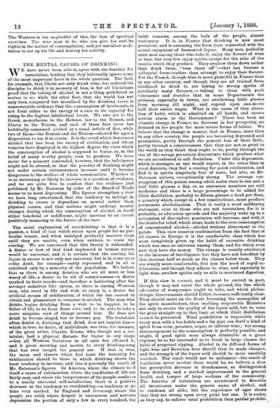b...PIRITUAL EXERCISES.
MR. STEAD has just given to the world (Grant Richards) a little volume containing the letters which be believes were dictated to his hand and pencil by "
the spirit of a dead woman. Readers of the book in question will probably agree with us when we refuse to take these communications very seriously, and regard them rather as the outcome of Mr. Stead's subconscious per- sonality than as authentic communications from the other vg,rid. But though the "Letters from Julia" do not appear to us to merit special attention on their spiritualistic side, they contain two practical suggestions which are worthy of notice. Mr. Stead's first proposal is that those who are anxious to lead the higher life, and to develop to the full their better natures, should adopt, with a difference, the use of the rosary. We are to tell our beads each day at a fixed hour, and also when we have any other vacant time. We are to tell them, however, not in order to reckon the number of prayers we have said, but for another purpose. As we daily run over our beads we are to think lovingly of our friends and also of our enemies, and to bring to bear upon them, and their lives, the power for good which is generated by good thoughts. Our friends, it is suggested, will be helped by the knowledge that they are being thought upon with kindness, and we ourselves shall gain much by calling to mind the duties which we owe to those with whom we are in close human relationship. The ritual of the rosary will keep them in remembrance, and us alive to the need of helping others in word and deed. That there is much that is very attractive in the notion we have no desire to deny. We are all far too apt to put our friends out of our minds, and to fail in kindness and love towards them, not because we are really unkind or love- less in intention, but simply because they are out of our thoughts. If we were less forgetful than we are we should, doubtless, be far more helpful to those who need human sym- pathy. But though we admit that on the surface the notion has much to recommend it, we doubt whether in practice it is likely to prove of value. A few saints may think that they are doing their duty better because of their rosary of friends and good causes, but in all probability they would have done it quite as well without this mechanical reminder. For the ordinary man we believe that the exercise would as often be a hindrance as a help towards the higher life. In such spiritual formalities there lurk for the mass of mankind the dangers of self-righteousness and hypocrisy,—the very dry- rot of the soul. There is a story of a much-indebted man of fashion who when he received a bill from one of his many creditors would solemnly stick it on a file with the exclama- tion,"Thank goodness that's settled!" Too many men, we fear, would tell their daily rosary with great unction, and, having given a loving thought to friend Robinson or a forgiving thought to enemy Jones, would feel that their duties towards their neighbours were comfortably settled. Possibly the first ten or twelve times of telling the rosary would lead to real thinking about Robinson and Jones, and about the best way of doing them good, but very soon the exercise would consist not of real thoughts but of vain repetitions. But such vain repetitions are far worse than useless, for they delude the mind into thinking that something has been accomplished, when in reality the con- science has only been drugged to sleep. Instead of doing anything, we have dreamt that it was done, and so left it undone. Thus, while Brown and Jones would get no true help or loving kindness, the spiritual forces of the devotee of the rosary would have been sapped and undermined. The world is full enough as it is of unconscious hypocrites and Pharisees; we do not want to add to them a number of persons who will thank God every night that they have not forgotten a single ' name in their rosary, and that therefore they must during that day have done their duty to their fellows. Imagine what a delight his rosary would have been to Mr. Peckaniff. Instead of telling his daughters to remind him when he took his bedroom-candle to pray specially for Mr. So-and-so who had injured him, he would have proclaimed that he had assigned a special bead in his rosary, 'the biggest and brightest,' to our dear but erring friend.' Mr. Pecksniff was, of course, a conscious hypocrite, but there are plenty of men who, without knowing it, stand on the verge of Pecksniffery. A rosary, and the frame of mind it would be liable to pro- duce in certain natures, would be enough to topple them over the edge.
Mr. Stead's second proposal strikes us as far more useful and far less likely to have bad results. It is that every man who wants to lead the higher life—the phrase, perhaps, savours a little of Pecksniff, but it is a convenient one— should devote some part of the day to solitude and contemplation, should, that is, save an hour or half an hour a day from the cares and amusements and worries of this life, and devote it to the re- possession of his own soul. That such a habit of quiet and meditation is good for men we cannot possibly doubt. We may drug our souls with rosaries and vain repetitions, but we may also drug them with the busy idleness of a hurried life. We say "idleness" advisedly, for most men who lead the ordinary active business life leave their souls in com- plete idleness. They hurry and they rush, they are occupied with a thousand questions, great and small : but as Matthew Arnold said, they never once possess their souls before they die. If a man is to give his soul its rights he must allow it times in which, untroubled alike by bodily activity and by mere mental activity, it can use its wings and travel unfettered in its own region, the region of pure thought. To most men the notion of an hour, or even half an hour, with nothing to do suggests acute torture. If they have nothing to do or to read, nothing, as they would say, with which to occupy their minds, they feel utterly lost. This fact is a proof of how much men need to acquire the habit of contemplation. The wings of the soul have become so stiff from want of use that the mere thought of stretching them out is painful. The habit of contemplation has, then, for most people, to be acquired by a conscious effort. But it is a habit well worth acquiring, and when it is once acquired it greatly strengthens and vivifies a man's nature. It will be said, what is a man to think about. in the hour or half-hour he gives up to daily meditation ?
In all probability the devils of worry—if not worse ' will seize the opportunity to run riot in his head. Work and occupation successfully guard the door against them, but meditation simply throws it wide open to these most un- welcome guests. No doubt for the morbid and the semi-insane meditation may have its dangers, but the normal man who learns bow to think may easily keep out the ordinary worries of life while he sets his mind to consider and dwell on the great issues of life and eternity, and of human conduct. In such times of meditation a man may and should consider in it widest aspect his duty towards his neighbour. He will not mechanically and formally run over lists of Mends and deaden his thought by repetition, but will, instead, think upon the laws which control human relationships. Wordsworth tells us that the Happy Warrior makes "his moral being his prime care." It is in and through contemplation that a man may train and develop his moral being, and may strengthen and develop his soul. It has been truly said that the greatest things that have been done in the world have been due to the victories of the spirit. But to gain the victories of the spirit contemplation is as necessary as is a base to an , army in the field.
No man, then, who wishes to do the best by himself, morally, spiritually, and intellectually, can afford to neglect the habit of contemplation. But though he uses contemplation, he must not forget that it is quite possible to abuse it. Though a man who has not got the contemplative habit in some degree, and so can think things out, will never do much in the world, it- is quite possible for a man to practise contemplation till it passes into dreaminess. We see this clearly enough in the history of the Eastern peoples. There contemplation is per es as attractive as per as it is distasteful here. The Eastern is too much attracted by the desire to possess his soul in peso& The Western is too neglectful of this, the best of spiritual exercises. The wise man is he who can give his soul its rights in the matter of contemplation, and yet not allow medi- tation to eat up his life and destroy his activity.











































 Previous page
Previous page